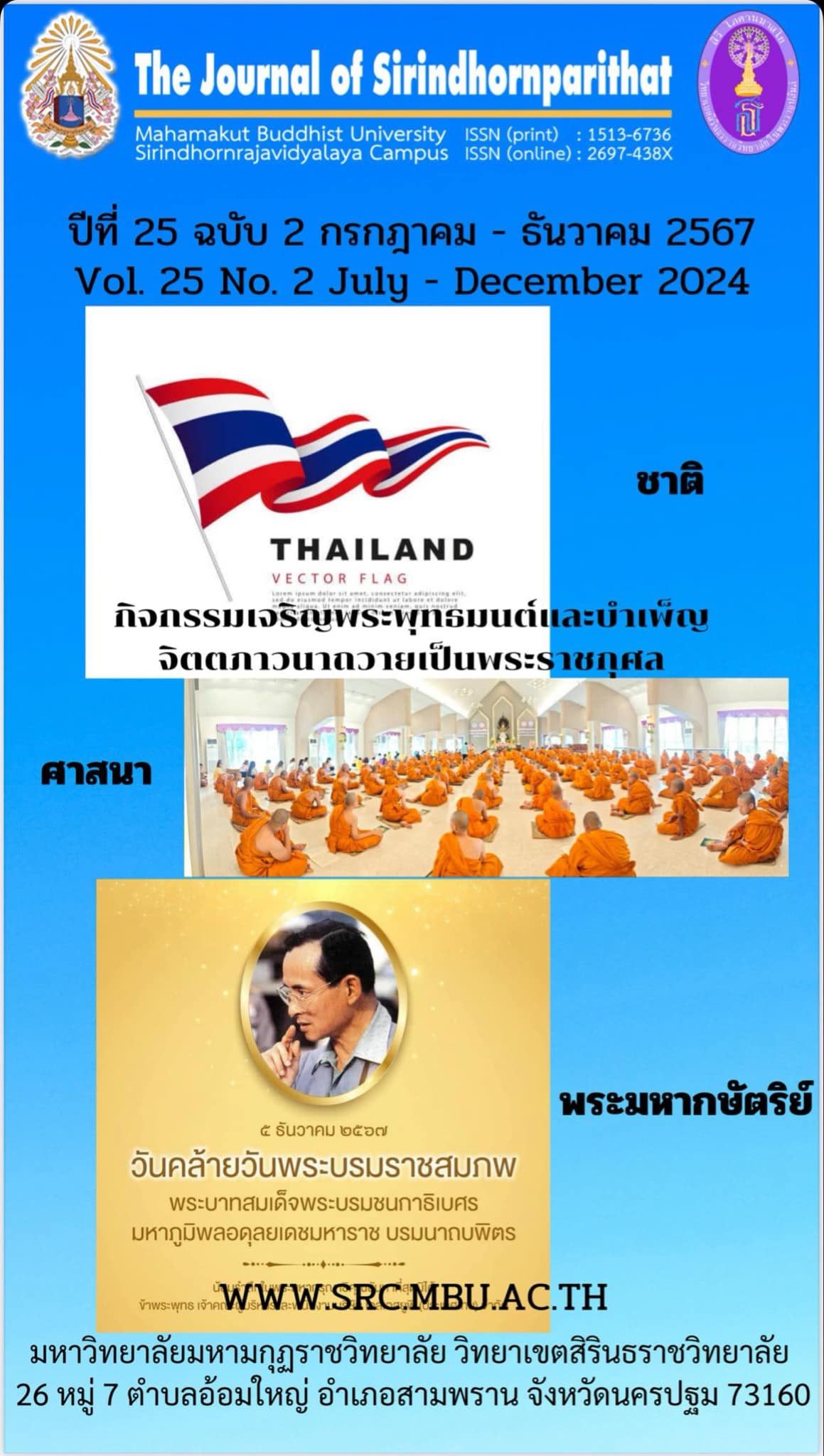School Administrators' Ethical Leadership And The Quality Of Working Life Of Teacher In School Under The Office Of Secondary Educational Service Area 1
Keywords:
School Administrators' Ethical Leadership, The Quality of Working LifeAbstract
The purposes of this research were to determine 1) School Administrators' Ethical Leadership under the Office of Secondary Educational Service Area 1. 2) The Quality of Working Life of teacher in school under the Office of Secondary Educational Service Area 1 and 3) The relationship between School Administrators' Ethical Leadership and The Quality of Working Life of teacher in school under the Office of Secondary Educational Service Area 1. The samples were 59 school under the Office of Secondary Educational Service Area 1. The 2 respondents in each school were; a school administrator or an acting school administrator and a head of learning group. There were 118 respondents. The research instrument was an opinionnaire about school administrators' ethical leadership based on the concept of Gary, Yukl and the quality of working life based on the concept of Richard Eugene, Walton. The descriptive statistic used for data analysis were frequency, percentage, arithmetic mean, standard deviation, and Pearson's product moment correlation coefficient. The research found that; 1)School Administrators' Ethical Leadership under the Office of Secondary Educational Service Area 1, as a whole were at a high level and each aspect were at the highest level and high level, ranking from the highest to the lowest arithmetic mean; fairness and justice, altruism, personal growth, empathy and healing, humility, empowerment, and integrity. 2) The Quality of Working Life of teacher in school under the Office of Secondary Educational Service Area 1, as a whole and each aspect were at a high level, ranking from the highest to the lowest arithmetic mean; social integration in the work organization, future opportunity for continued growth and security, immediate opportunity to use and develop human capacities, the social relevance of work life, safe and healthy working conditions, adequate and fair compensation, and work and the total life space. 3) The relationship between School Administrators' Ethical Leadership and the Quality of Working Life of teacher in school under the Office of Secondary Educational Service Area 1 was found correlated as a whole at a Moderate level with .01 level of significance which was positive correlated.
References
กำชัย เสนากิจ. (2557). คุณภาพชีวิตการทำงานของครู สังกัดสำนักงานเขตพื้นที่การศึกษามัธยมศึกษาเขต 26. (วิทยานิพนธ์ครุศาสตรมหาบัณฑิต), สาขาวิชาการบริหารการศึกษา บัณฑิตวิทยาลัย มหาวิทยาลัยราชภัฏมหาสารคาม.
เกวลี ตระกูลสุขทรัพย์. (2564). บรรยากาศองค์การที่ส่งผลต่อคุณภาพชีวิตการทำงานของครูในสถานศึกษาสังกัดสำนักงานเขตพื้นที่การศึกษามัธยมศึกษาประจวบคีรีขันธ์. (วิทยานิพนธ์ครุศาสตรมหาบัณฑิต), สาขาวิชาการบริหารการศึกษา คณะครุศาสตร์ มหาวิทยาลัยราชภัฏหมู่บ้านจอมบึง.
จตุพงษ์ สอนศรี. (2565). การศึกษาเปรียบเทียบระดับภาวะผู้นำเชิงจริยธรรมของผู้บริหารสถานศึกษาในการบริหารงานบุคลากร ของโรงเรียนในสังกัดสำนักงานเขตพื้นที่การศึกษามัธยมศึกษาเชียงราย. (วิทยานิพนธ์ครุศาสตรมหาบัณฑิต), สาขาวิชาการบริหารการศึกษา บัณฑิตวิทยาลัย มหาวิทยาลัยราชภัฏเชียงราย.
คณาวุฒิ กังวาลเนาวรัตน์. (2564). ภาวะผู้นำเชิงจริยธรรมของผู้บริหารสถานศึกษา สังกัดสำนักงานเขตพื้นที่การศึกษามัธยมศึกษานครปฐม. (วิทยานิพนธ์ศึกษาศาสตรมหาบัณฑิต), แขนงวิชาบริหารการศึกษา สาขาวิชาศึกษาศาสตร์ มหาวิทยาลัยสุโขทัยธรรมาธิราช.
ประกาศ เรื่อง ยุทธศาสตร์ชาติ (พ.ศ. 2561 - 2580). (2561, 13 ตุลาคม). ราชกิจจานุเบกษา. เล่ม 135
ภัทริกานต์ บุญฤทธิ์. (2566). ปัจจัยบรรยากาศองค์การที่ส่งผลต่อคุณภาพชีวิตการทำงานของครูโรงเรียนสังกัดสำนักงานเขตพื้นที่การศึกษามัธยมศึกษาสงขลา สตูล. (สารนิพนธ์ศึกษาศาสตรมหาบัณฑิต), สาขาวิชาการบริหารการศึกษา มหาวิทยาลัยหาดใหญ่.
วันเฉลิม รูปสูง. (2564). ภาวะผู้นําเชิงจริยธรรมของผู้บริหารสถานศึกษาที่ส่งผลต่อคุณภาพชีวิตในการทํางานของครู สังกัดสํานักงานเขตพื้นที่การศึกษาประถมศึกษาสุพรรณบุรี เขต 2. (วิทยานิพนธ์ครุศาสตรมหาบัณฑิต), สาขาวิชาการบริหารการศึกษา มหาวิทยาลัยราชภัฏนครปฐม.
ศิริชัย กาญจนวาสี, ทวีวัฒน์ ปิตยานนท์ และ ดิเรก ศรีสุโข. (2559). การเลือกใช้สถิติที่เหมาะสมสำหรับการวิจัย. (พิมพ์ครั้งที่ 7). กรุงเทพฯ: โรงพิมพ์จุฬาลงกรณ์มหาวิทยาลัย.
เศรษฐ์ คุณทาบุตร. (2556). ภาวะผู้นำเชิงจริยธรรมของผู้บริหารโรงเรียนมัธยมศึกษาจังหวัดเลย. (วิทยานิพนธ์ศึกษาศาสตรมหาบัณฑิต), แขนงวิชาบริหารการศึกษา สาขาวิชาศึกษาศาสตร์ มหาวิทยาลัยสุโขทัยธรรมาธิราช.
สถาบันส่งเสริมความปลอดภัย อาชีวอนามัย และสภาพแวดล้อมในการทำงาน (องค์การมหาชน). (2562). คุณภาพชีวิตในการทำงาน Quality of Working Life. [ออนไลน์]. สืบค้นเมื่อ 20 เมษายน 2566. จาก https://www.tosh.or.th/index.php/blog/item/475-quality-of-working-life.
สำนักงานคณะกรรมการพัฒนาเศรษฐกิจและสังคมแห่งชาติ. (2565). แผนพัฒนาเศรษฐกิจ และ สังคมแห่งชาติ ฉบับที่ 13 (พ.ศ.2566 – 2570). [ออนไลน์]. สืบค้นเมื่อ 20 เมษายน 2566. จาก https://www.nesdc.go.th/download/Plan13/Doc/Plan13_Final.pdf
สำนักงานเลขาธิการสภาการศึกษา. (2550). รายงานวิจัยผลกระทบโลกาภิวัตน์ต่อการจัดการศึกษาไทยใน 5 ปี ข้างหน้า. นนทบุรี: ออฟเซ็ท เพรส.
สุรัตน์ ไชยชมภู. (2557). ภาวะผู้นำเชิงจริยธรรมในการบริหารสถานศึกษา. วารสารการบริหารการศึกษา มหาวิทยาลัยบูรพา. 8(2): 1.
Cronbach, Lee J. (1984). Essentials of Psychological Testing. (4th ed). New York: Harper and Row Publisher.
John, W. Best. (1970). Research in Education. New Jersey: Prentice-Hall Inc.
Likert, Rensis. (1992). New Pattern of Management. New York McGraw – Hill Book Company.
Robert V. Krejcie and Daryle w. Morgan. (1970). Determining Sample Size for Research Activities. Journal for Educational and Psychological Measurement No.3: 608.
Downloads
Published
Issue
Section
License
Copyright (c) 2024 Mahamakut Buddhist University

This work is licensed under a Creative Commons Attribution-NonCommercial-NoDerivatives 4.0 International License.
บทความที่ได้รับการตีพิมพ์เป็นลิขสิทธิ์ของ มหาวิทยาลัยมหามกุฏราชวิทยาลัย วิทยาเขตสิรินธรราชวิทยาลัย
ข้อความที่ปรากฏในบทความแต่ละเรื่องในวารสารวิชาการเล่มนี้เป็นความคิดเห็นส่วนตัวของผู้เขียนแต่ละท่านไม่เกี่ยวข้องกับหาวิทยาลัยมหามกุฏราชวิทยาลัย วิทยาเขตสิรินธรราชวิทยาลัย และคณาจารย์ท่านอื่นๆในมหาวิทยาลัยฯ แต่อย่างใด ความรับผิดชอบองค์ประกอบทั้งหมดของบทความแต่ละเรื่องเป็นของผู้เขียนแต่ละท่าน หากมีความผิดพลาดใดๆ ผู้เขียนแต่ละท่านจะรับผิดชอบบทความของตนเองแต่ผู้เดียว



